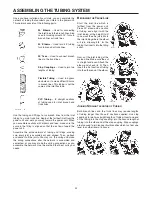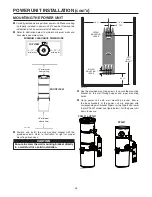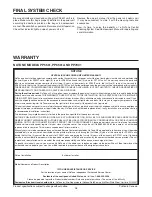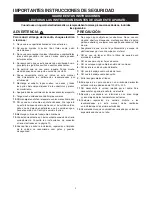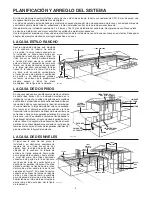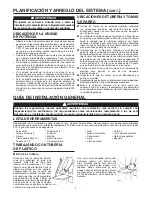
23
ASSEMBLING THE TUBING SYSTEM (
CONT
'
D
)
C
ONNECTING
A
B
RANCH
L
INE
A branch line connects the inlet
line to the trunk line. Follow the
methods previously described
for aligning, marking and cutting
the inlet tubing. Attach a 90°
elbow and run tubing from the
inlet line to the trunk line.
To align and measure the
branch line, attach a 90° tee
fitting to the trunk line. Make
sure the tee connects with the
air flow going toward the power
unit. Align, measure, and mark
the branch line for inserting it
into the tee fitting. Then, cut
the branch line to length and
insert it into the tee. Check to
make sure the cut is straight
and even. Connect the next
section of tubing to the out-take
side of the tee fitting. Continue
the trunk line until you come
to another branch line junction
point.
C
IRCUMVENTING
AN
O
BSTACLE
Wherever possible the branch lines should connect to the trunk
line in straight paths. The fewer turns in a tubing system, the
more efficient air flow. Accordingly, you should locate the inlets
to avoid zig-zags in the branch lines. But, sometimes, when
you just can’t avoid an obstacle, you are required to construct
the tubing around it.
In the example illustrated here, you might run the branch line
at an angle to avoid a chimney. Then, once the branch line
has run past the chimney, you can use a 45° elbow to turn
the branch line back perpendicular to the trunk line. Again, the
branch line and the trunk line connect with a 90° tee.
You can also use a piece of flexible tubing to run a branch line
around an obstacle. See “Using Flexible Tubing,” on next page.
C
OMPLETING
THE
T
RUNK
L
INE
Continue to run the trunk line toward the power unit, connecting
all branch lines as you go along. Again, make sure you connect
all fittings with the air flow toward the power unit.
Bring the trunk line to the
access hole you have drilled
for the power unit’s intake tube.
Place a 90° elbow over the
hole and cut the trunk line to fit
into this final elbow. Allow 5⁄8˝
of tubing to fit into the elbow’s
collar. Connect the elbow to
the trunk line so that it aligns
over the intake access hole.
You will make the intake tube
connection itself after you have
installed the power unit.
When you are satisfied that all fittings and tubing are aligned for
maximum air flow, make sure that all your cuts are square and
that all joints are tight. Then, prepare the tubing and cement
the joints as described in “Working With Plastic Tubing,” page 5.
C
ONNECTING
THE
L
OW
-V
OLTAGE
W
IRING
Ideally, you will run the wiring and make all the wiring
connections after you have completed the tubing system. Of
course, the inlet wiring must be run at the time the inlet tubing
is threaded through the walls.
Run the low voltage wiring along the trunk line; at approximately
12˝-18˝ intervals, use electrical tape to secure the wire to the
tubing. Then, run wiring along the branch lines from the inlet
lines to the trunk line. Also secure this wiring with electrical
tape.
AO0055
AO0056
Branch Line
Make sure
air flows
toward
Power Unit
To Power Unit
AO0057A
AO0058
AO0059
AO0060
AR0037
AO0061














